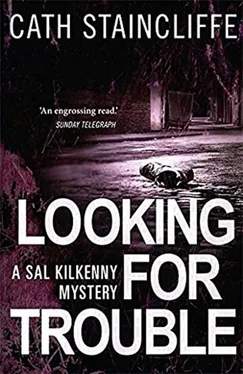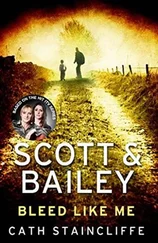‘In the building. He’s known as Smiley. He’s got a scar…’
Miller held up his hand. ‘This isn’t a bloody gangster movie.’ He leant towards me. ‘No crime has been committed.’
‘It has,’ I insisted. ‘Murder.’
‘Wrong.’ He stabbed his finger at me. ‘The facts speak for themselves. There’s only one murder, that of Janice Brookes.’
‘But Martin’s the link. They must be connected.’
‘Not as far as I’m concerned. You’ve been under too much pressure, Miss Kilkenny.’ He shook his head to and fro. ‘Dealing with an accidental death and now this. Way out of your league. Can’t be an easy job for a woman, anyway. We know what we’re doing. We take it from here. You need a break; take the kiddies away for a few days. Help you to get things in the right perspective. This sort of hysterical reaction doesn’t help anybody.’ He moved towards the door. Tintin followed. ‘We’ll be doing our level best with the Brookes case, I can assure you of that.’
I was glad I hadn’t offered the bastard a cup of tea.
Well, I’d done my duty. I’d passed on Leanne’s story. If DI Miller thought I was going to sit back and twiddle my thumbs, he’d another think coming. Oh, they could solve the murder, I wouldn’t tread on any toes there, but I would solve the mystery. I had to know why Janice Brookes was willing to spend a grand tracing a runaway schoolboy. And if I hadn’t easy access to the Brookes family, then I’d start with the other side of the family. With the real Mrs Hobbs.
The rain came down like stair rods as I drove over to Bolton. Traffic was bad, with road-works along the M61. I made it to St. Matthew’s just before the end of lunch break.
After a few enquiries, I found Max Ainsworth in the Chemistry Lab. The smell of sulphur took me straight back to interminable Friday afternoons, perched on a high wooden stool, listening to Miss Jackson drone on. We’d given her hell. Turning on unlit Bunsen burners in attempts to gas the class out of existence, competing with each other to see how many test-tubes could be broken during one experiment. At fourteen, we dropped chemistry like a shot.
‘Max, can I have a quick word?’ He followed me out into the corridor.
“S it about Martin?’ He looked concerned.
‘Yeah. He’s okay. I managed to find him. He’s living in Manchester. The thing is, I never got his parents’ address, only the phone number, and the damn thing’s out of order.’
‘It’s Glover Street, twenty-three, I think, twenty-three or twenty-five. ‘S got one of them clipped hedges, shaped like a bird, you know.’
‘Thanks. You never went there?’
‘Just to call for him once, when we went fishing, like.’
‘You ever meet his parents?’
He thought about it, frowning through his thick glasses.
‘Nope.’
‘Martin say anything about them?’
‘No. He wasn’t one for talking. Why?’
‘That’s why he left, his parents.’
‘Oh.’ He reddened slightly. ‘So he’s alright then?’
‘Well, he’s alive, he’s got somewhere to stay, that’s about all I know.’
‘Better go,’ Max grinned. ‘Here comes Tiny.’ A huge man with a small, bald head was steaming towards us down the corridor. I thanked Max and left him to his potions.
It wasn’t far to Glover Street, according to the A- Z, but I wasn’t exactly raring to get there. Lunch first. I don’t know Bolton and didn’t fancy tackling the one-way system in the town centre, so I drove around the outskirts till I found a corner cafe.
That was a mistake. It was a genuine greasy spoon. I don’t eat meat and the only vegetarian options were fried egg on toast or beans on toast. Beans seemed a safer bet. There’s not much you can do to render a bean inedible. Not much, but whatever there was, they’d done it. Mushy, overcooked, crusty round the edges. The colour of the tea matched the beans. Coated my mouth instantly with orange fuzz. In my student days,
I’d survived on meals like that, even enjoyed them. Long time ago.
The house on Glover Street was a large ‘thirties semi. The ridiculous privet chicken marked it out from the rest. The garage was shut, no car in the driveway. There was no response to the bell. I peered through the frosted glass, trying to detect any movement. Then I crouched down and peered through the letter-box.
‘Can I help, dear?’ Startled, I jumped to my feet and whirled round. The woman on the pavement had a small terrier on a lead.
‘I was looking for Mrs Hobbs.’ I walked down the path. ‘There doesn’t seem to be anyone in.’
‘They’re away, dear. Back tonight. Malta. They go twice a year. I keep an eye on the place. I’m next door.’ She nodded her head to the left. I sensed she required some sort of explanation.
‘I’m a friend of Martin’s.’
Her face creased with concern. She moved nearer and lowered her voice. ‘A terrible business. It put years on Sheila. Is there any improvement?’ The dog snuffled around my ankles.
‘No, I don’t think so,’ I said carefully.
‘These things take time, don’t they? So young.’ She shook her head and sighed too. The dog made interested grunting sounds. I kept quiet, hoping desperately for a clue. ‘Still, they can do a lot these days, can’t they? Not like it used to be. I knew a lady worked up at Prestwich – the stories she used to tell. Poor things stuck in strait-jackets, given electric shocks.’ She touched my arm. ‘If you ask me, people got better in spite of all that, not because of it.’
‘Yes.’ I smiled and nodded. The dog mounted my right leg and made disconcerting movements. I tried to edge away. ‘Well, I’d better be going,’ I said. ‘I’ll call some other time.’
‘Okey-dokey. Come on, Millie.’ She tugged the terrier away. It nearly choked; straining to return to my feet.
So, the neighbours had been told that Martin was in a mental institution. A funny sort of explanation for his sudden disappearance. Would admitting he’d run away be more embarrassing? Possibly. People would’ve expected them to be making every effort to find him, enquiring about their efforts. This way, the issue could be avoided. A simple ‘no improvement’ would solicit sympathy and a change of conversation.
‘But that’s awful,’ Diane said.
I shrugged. ‘Stops people asking too many questions.’
‘Do you think they knew this woman, then?’
‘No idea. She could have been a friend of the family, but that doesn’t really tell me why she was so keen to find Martin.’
We were on our second pint and I’d taken Diane through the whole caboodle, eliciting just the right exclamations as I related seeing the photo in the paper, Leanne’s story, the attitude of the police.
‘You look tired, Sal.’
‘Don’t you start. I’m always tired anyway, comes with motherhood, you know.’
‘It’s not just that,’ said Diane. ‘This job, it’s such a mess. No-one’s paying you any more. Why bother?’
‘I want to know who she was, why she was after him.’
‘Why?’ Diane was pushing me. I didn’t like it.
‘Curiosity, loose ends.’ I took a long drink. Diane started to speak, then thought better of it.
‘What?’ I demanded.
‘Nothing.’
‘What?’
She sighed. ‘Curiosity killed the cat.’
‘Diane! That’s pathetic. Anyway, I’m not a cat.’
‘Sorry. I just worry about you. There has been a murder after all…after last year…’
‘Don’t,’ I interrupted. Diane had been my confidante throughout the case which had ended with me getting knifed. She also knew how close I’d come to falling apart in the months afterwards. I thought she’d understood my decision to carry on in my line of work. How it was all tied up with wanting to be strong again, asserting my right to earn my living this way, not wanting to spend the rest of my life ruled by fears of what might happen. Maybe she just thought I was being pig-headed.
Читать дальше












